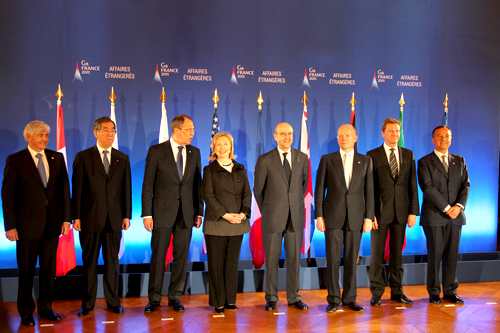This weekend a number of these foreign ministers – most notably United States Secretary of State Hillary Clinton and Germany’s Guido Westerwelle – will convene at the invitation of Foreign Minister Patricia Espinosa in Los Cabos Mexico (in June the G20 Leaders Summit will meet at Los Cabos). – For the first time these ministers gather under the G20 umbrella to discuss – at least in principal – “foreign and security” policy.
Is this then the final grand leap of the G20? Will the Leaders Summit now include a full global summitry agenda economic, financial, peace and security? Will G20 Leaders gather to tackle economic and financial regulatory reform and securities crises as well?
Well – not exactly.
Among the G20 there has always been tension, if not outright contention, over the scope of the Leaders Summit agenda. While some G8 countries have urged tackling at least questions on nuclear non-proliferation, or crisis management and resolution, others, notably non G8 countries such as China and Brazil have resisted any extension which would bring peace and security issues to the G20 agenda and remove it from the UN Security Council. As Bruce Jones Director of “Managing Global Order Project” at the Brookings Institution declared
What is left behind is foreign and security policy … In this regard, the G-20 foreign ministers meeting in Los Cabos represents the first real opportunity we’ve had to begin that work.
Bruce has gathered a number of experts and former ministers from around the G20 to reflect on this upcoming meeting at the Brookings Institution website. In general Bruce and his colleagues support the calling of this meeting. Among those is Celso Amorim, former Foreign Minister of Brazil, who writes:
Without exaggerating the scope of the changes that may begin with the February meeting of Foreign Ministers in Mexico, one is allowed to hope that it can at least initiate a process which someday will impact on the formal institutions that deal with political and security matters. In order that such a process may take place, it is essential that the FM meeting focuses on concrete questions – such as the ones mentioned here [Arab Spring, the Iranian nuclear program, a broader-based approach to Africa] – and does not lose much time and energy on more abstract issues of institutional nature Nor should it bother too much with other subjects – important as they may be – which have already found an appropriate locus for debate, such as climate change.
So support for sure, but also demands for greater precision as well on the agenda. And the reality matches the commentary. Clearly there was no unanimity on the need – desire for – this meeting. The Mexican foreign minister, the host, has made clear this meeting is “informal” and not a Summit – meaning no summit declaration. In addition 8 countries have not sent foreign ministers but rather lower ranking officials including France, China, Brazil and India.
So it appears that there are a number of questions that ‘dog’ the question of G20 foreign ministers meetings. Key among those is the agenda. The Mexican foreign minister has suggested that the meeting will tackle “pressing issues” including food safety, strengthening the rule of law and providing efficient and coherent leadership to tackle global challenges. He also made clear that the the group would discuss but rule out statements on critical crisis issues such as Syria. So less on crisis management – at least formally – and more on issues that Lee Dong-hwi of IFANS in Korea, another of the Brookings invited experts, calls “hybrid issues” – issues where economic and security issues are inextricably linked. This indeed may be the incremental way to extend the agenda to more “peace and security-like” issues. But food security and climate change might best be discussed by others – rather than the foreign ministers. The foreign ministers after all represent a more traditional conception of diplomacy. Once foreign ministers were the only officials that dealt with international matters in global settings. But that is long gone.
In the “Iceberg Theory” of global summitry (see my June 2011 blog post “The Iceberg Theory of Global Governance – Seeing it Work”), of which I am a strong advocate, obviously, significant ministerial, working party and transgovernmental regulatory networks (TRNs) including a wide variety of intergovernmental, ministerial, regulatory and administrative institutions, are tasked – by Leaders and Ministers – with developing standards and policy reforms that then need to be implemented by national authorities. Leaders Summits are but the “tip of the iceberg” of global summitry.
So, it is not at all clear that foreign ministers are the best at dealing with many of these not really policy subjects for foreign ministers. But if it is “crisis management” that will occupy the agenda, then the China’s, Brazil’s and others will insist that the discussions need to be at the UNSC.
Nevertheless it may be that the foreign ministers may best tackle crisis prevention matters and at least publicly limit, at least for the moment, the immediate crisis situations – though it is a setting where at least countries avoid the distorting impact of the “all mighty Security Council veto”. And I think Bruce Jones has picked up on this crisis prevention agenda and the “speak softly approach” for crisis management:
Far more important is relationship building, building shared perspectives on key security issues, nd an informal space for back room negotiations. I suspect that Secretary Clinton will use quite a lot of her time in Los Cabos cornering her Chinese and Russian colleagues on the Syria question – and that’s very much to the good.
So let’s urge a crisis prevention approach and a discussion of current security crises – even if those aspects of the discussion are left to the back room for now.
Photo Credit: Wikimedia Commons


